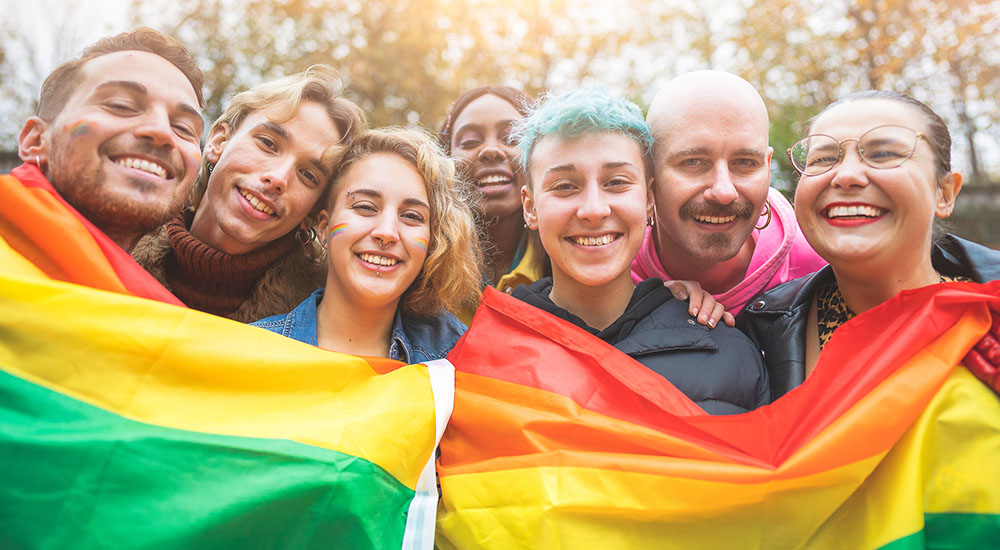LGBTQ+ Veterans are at a disproportionate risk for suicide and other poor health outcomes, including discrimination and barriers to care. Although VA requires health care be delivered in an affirming and inclusive environment, a clinical care gap remains.
To answer this critical need, in 2016 a clinician at Hampton VA developed PRIDE In All Who Served (PRIDE), a health promotion group for LGBTQ+ Veterans. Group facilitators follow a session-by-session manual that builds a peer support system while empowering LGBTQ+ Veterans to better navigate the VHA system, reducing health care disparities.
With support from the VHA Diffusion of Excellence program, the team behind PRIDE scaled it to 10 new sites by 2021. Just two years later, PRIDE is now available at more than 50 VA facilities across 26 states, with 18 additional facilities actively adopting the practice.
Critical need for PRIDE
Suicide is the leading cause of death for LGBTQ+ Veterans aged 18-29 and ranked 5th for LGBTQ+ Veterans of all ages. As VA seeks to drive equity for LGBTQ+ Veterans and prevent Veteran suicide, programs like PRIDE are filling critical care gaps and increasing social connectiveness.
This focus on whole health aligns with the VA Under Secretary of Health’s priorities of not only caring for immediate health concerns but also addressing what Veterans need and want by creating an inclusive whole health system of care.
Building protective factors
PRIDE offers 10 weekly sessions in which Veterans meet for one hour in small groups virtually, in person or in a hybrid format. The curriculum covers topics such as continuums of identity, coming out, healthy relationships, LGBTQ+ families and affirmative care.
The program provides the opportunity to connect with other LGBTQ+ Veterans and build a support system. Connection and social support provide protective factors against suicide, stigma-related stress and other negative health outcomes for LGBTQ+ individuals.
A Veteran who participated in the program said, “Since coming to the group, I no longer want to kill myself. I have found others who support me.” Another Veteran participant stated, “The group gave me the confidence to come out. It provided a starting point and direction for my next steps in my journey.”
The positive impact of PRIDE
The PRIDE National Diffusion Team, which manages the program and its expansion, carefully tracks metrics. Veteran-reported outcomes include a reduction in likelihood of suicide attempts as well as in symptoms of depression, anxiety and identity stress.
The PRIDE National Diffusion Team routinely evaluates the curriculum as well as Veteran and facilitator feedback to ensure the program continues to meet the needs of LGBTQ+ Veterans.
“One of the most exciting things we get to do is think about the future needs of our LGBTQ+ Veterans since their needs are constantly shifting,” said Heather Sperry, LGBTQ+ Program Manager at Indiana VA. “It’s our job to keep up and evolve with them and shift the content to meet our Veterans’ current needs.”
The PRIDE program has offered six training cohorts so far, including individualized training on how to launch and facilitate the PRIDE groups. The goal is to continue to replicate the program and reach all LGBTQ+ Veterans. PRIDE was recommended as a Clay Hunt SAV Act Best Practice for Suicide Prevention in 2022.
Looking to the future, PRIDE is creating an advisory board with Veterans, clinicians and other stakeholders to offer guidance and expertise as PRIDE makes updates to the manual, clinician training programs and implementation plans. VA wants to be an example of inclusion offering world-class health care to all Veterans.
Topics in this story
Link Disclaimer
This page includes links to other websites outside our control and jurisdiction. VA is not responsible for the privacy practices or the content of non-VA Web sites. We encourage you to review the privacy policy or terms and conditions of those sites to fully understand what information is collected and how it is used.
More Stories
The Medical Foster Home program offers Veterans an alternative to nursing homes.
Watch the Under Secretary for Health and a panel of experts discuss VA Health Connect tele-emergency care.
The 2024 National Veteran Suicide Prevention Annual Report provides the foundation for VA’s suicide prevention programs and initiatives.







Why does the VA celebrate Queer people?
It’s contrary to our moral foundation as a Christian nation. We should help “queer” people become “unqueer”, not celebrate.
This is so needed. Pleases don’t email me because of fear.
Why is the VA pigeon holing specific groups, sexes, skin color etc? Aren’t we all Veterans? A Veteran is a Veteran, and there should be no differences because of skin color, sexual orientation, or any other so called reason to excel one or more groups above the general meaning of a Veteran. If any special attention is feasible, it is to us older combat Veteran. Yes there is a difference is Veterans after all.
I for one am tired of being put at the bottom because I am an old white guy.
VA fails to acknowledge sex and gender minorities do not identify as “LGBTQ”. At some point those behind VA’s “LGBTQ” programs will be going to prison.